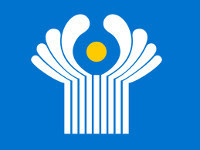Who needs to breathe life into rotten remains of former USSR?

The issue of the feasibility of the CIS is back on the agenda. Experts have quite a legitimate question: why do we need these semi-dead formations like the Commonwealth? In addition, many participants of the CIS tend to simply ignore some initiatives of the organization. Complex intrigues also take place in the CIS.
The organization was founded on December 21st, 1991 by representatives of 11 countries, including Armenia, Azerbaijan, Belarus, Kazakhstan, Kyrgyzstan, Moldova, Russia, Tajikistan, Turkmenistan, Uzbekistan, Ukraine, followed by the addition of Georgia. The integration clearly has not developed, and centrifugal attitudes have prevailed. This was not only because of the fear of the revival of Moscow monopoly, but also because of the presence of a variety of goals and problems in the relations with each other.
In October of 2010, Belarus, Kazakhstan, Kyrgyzstan, Russia and Tajikistan, members of the Customs Union, have signed an agreement on the establishment of the Eurasian Economic Community, increasing integration. On the contrary, Georgia withdrew from the CIS in 2009, and Ukraine and Turkmenistan have not become members of the Commonwealth, limiting participation to their status of the host country and a participant. Azerbaijan and Moldova, although members of the CIS, do not recognize it as a subject of international law.
However, at the summit in Minsk on October 25th it appeared that the interest in the organization is increasing again. The meeting chaired by Belarus was attended by all top leaders of member states with the exception of the leaders of Kyrgyzstan and Turkmenistan. The participants agreed that the "Commonwealth of Independent States had to be maintained and developed as an important platform for international dialogue on a wide range of issues." 17 draft documents regulating cooperation in various fields were reviewed. The document entitled "Agreement on establishment of the Interstate Council for Anti-Corruption" has attracting the most significant attention. What kind of corruption is it talking about and who will fight with it?
Pravda.Ru turned to experts with questions about the future of the CIS. Namely, they were asked about their assessment of the possible vectors of the CIS, the role played in this organization by Russia, the reasons behind the absence of certain leaders at the summit and Ukraine's chairmanship in the new year, considering that it is not a member.
Deputy Director of the Institute of CIS Vladimir Zharihin had to reflect on the positive aspects as appropriate for his title. "We need to develop the CIS, but only as a territorial association of countries, while the integration of military and political initiatives should be developed by other projects. The CIS is an umbrella structure under which closer unions develop," said the expert. Zharihin sees nothing wrong in the fact that some leaders refuse to participate in the summits. President of Turkmenistan traditionally ignores these summits, said Zharihin, because the country lives a quite isolated life.
As for Kyrgyzstan, the level of its presence was reduced on purpose. Kyrgyzstan is unhappy with the position of Belarus that refuses to deport the former Kyrgyz President Bakiyev charged with a criminal offense. What's in it for Russia? "This structure (CIS) brings together the countries that are Russia's closest neighbors. This is information exchange where close associations are formed such as EurAsEC and CSTO," said Zharihin.
The CIS project is likely an image project, Sergey Pukhov, a senior researcher at the Institute "Development Center" of Higher School of Economics that has traditionally (as a western school) been skeptical of the CIS told Pravda.Ru. Pukhov believes that the primary purpose of the CIS is a rational use of the resources that are left after the collapse of the Soviet Union. That is, "an attempt to somehow combine industrial complexes that are still relevant."
"But this integration is largely based on the raw material resources of Russia and Kazakhstan. For Russia this is an image project," said Pukhov. He believes that other members should have a balanced approach towards their participation and should develop competitive industries. "The attendance or absence of state leaders in this sense does not play a key role," said the expert. "The CIS has a potential and future, but this is an example of how hard it is to implement them, as it is getting more fragmented rather than integrated."
"The CIS reveals a multi-vector, or, in fact, a no-vector policy followed by Ukraine these years," told Pravda.Ru Alexei Natalenko, a member of the National Council of the Union of Ukrainian citizens. The CIS today has "a point of attraction, a point of assembly," and this is Russia that has significantly strengthened its position over the recent years. Now the main task is capacity building for Eurasian cooperation, but without real cooperation, including in the sphere of military-technical cooperation, this will be impossible," said Natalenko.
Against this background, the policy of Ukraine is starting to slip. Signing the agreement on the Eastern Partnership, Ukraine has the idea of the CIS and EurAsEC. Verbally, Ukraine is in the CIS, but legally it is in a different legal framework, the European Union. For Ukraine chairmanship in the CIS and its fictional status of observer is a chance to create the appearance of cooperation in the post-Soviet space, which is necessary for the so-called "Eastern vector." This is important in the upcoming presidential election year. Natalenko said that there were no specific measures such as elimination of border controls.
Experts agree that the CIS is a top leaders' club for the formation of tighter blocks with moments of political game and a negligible vector of economic cooperation. All three experts were puzzled with the document calling to fight corruption. "An Interstate Agreement on corruption is adopted by the people who lead this corruption, from places where there is dictatorship. The results of the fight of bees against honey do not inspire optimism," said Natalenko.
"It's more of a nice gesture than a real possibility of fighting corruption. Bakiyev was accused of corruption and other crimes, and Belarus has granted him citizenship," said Zharihin.
"The fight against corruption is not even an image-building act but a trend, so to speak, the requirement of modern times. This is one of the vectors of the global development, and the CIS is moving in that direction, but what exactly is meant by it I am not sure," said Pukhov.
The conclusion is the following: if there were fewer such useless statements, then people would have believed in the seriousness of your intentions, dear presidents of the Commonwealth of Independent States.
Lyuba Lulko
Pravda.Ru
Subscribe to Pravda.Ru Telegram channel, Facebook, RSS!
